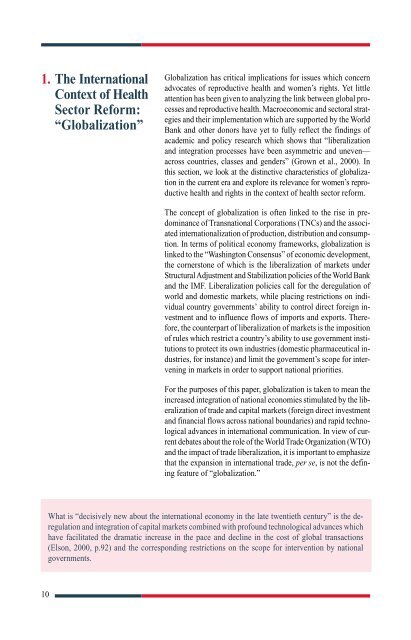Globalization, Health Sector Reform, Gender and ... - Ford Foundation
Globalization, Health Sector Reform, Gender and ... - Ford Foundation
Globalization, Health Sector Reform, Gender and ... - Ford Foundation
- No tags were found...
You also want an ePaper? Increase the reach of your titles
YUMPU automatically turns print PDFs into web optimized ePapers that Google loves.
1. The InternationalContext of <strong>Health</strong><strong>Sector</strong> <strong>Reform</strong>:“<strong>Globalization</strong>”<strong>Globalization</strong> has critical implications for issues which concernadvocates of reproductive health <strong>and</strong> women’s rights. Yet littleattention has been given to analyzing the link between global processes<strong>and</strong> reproductive health. Macroeconomic <strong>and</strong> sectoral strategies<strong>and</strong> their implementation which are supported by the WorldBank <strong>and</strong> other donors have yet to fully reflect the findings ofacademic <strong>and</strong> policy research which shows that “liberalization<strong>and</strong> integration processes have been asymmetric <strong>and</strong> uneven—across countries, classes <strong>and</strong> genders” (Grown et al., 2000). Inthis section, we look at the distinctive characteristics of globalizationin the current era <strong>and</strong> explore its relevance for women’s reproductivehealth <strong>and</strong> rights in the context of health sector reform.The concept of globalization is often linked to the rise in predominanceof Transnational Corporations (TNCs) <strong>and</strong> the associatedinternationalization of production, distribution <strong>and</strong> consumption.In terms of political economy frameworks, globalization islinked to the “Washington Consensus” of economic development,the cornerstone of which is the liberalization of markets underStructural Adjustment <strong>and</strong> Stabilization policies of the World Bank<strong>and</strong> the IMF. Liberalization policies call for the deregulation ofworld <strong>and</strong> domestic markets, while placing restrictions on individualcountry governments’ ability to control direct foreign investment<strong>and</strong> to influence flows of imports <strong>and</strong> exports. Therefore,the counterpart of liberalization of markets is the impositionof rules which restrict a country’s ability to use government institutionsto protect its own industries (domestic pharmaceutical industries,for instance) <strong>and</strong> limit the government’s scope for interveningin markets in order to support national priorities.For the purposes of this paper, globalization is taken to mean theincreased integration of national economies stimulated by the liberalizationof trade <strong>and</strong> capital markets (foreign direct investment<strong>and</strong> financial flows across national boundaries) <strong>and</strong> rapid technologicaladvances in international communication. In view of currentdebates about the role of the World Trade Organization (WTO)<strong>and</strong> the impact of trade liberalization, it is important to emphasizethat the expansion in international trade, per se, is not the definingfeature of “globalization.”What is “decisively new about the international economy in the late twentieth century” is the deregulation<strong>and</strong> integration of capital markets combined with profound technological advances whichhave facilitated the dramatic increase in the pace <strong>and</strong> decline in the cost of global transactions(Elson, 2000, p.92) <strong>and</strong> the corresponding restrictions on the scope for intervention by nationalgovernments.10
















